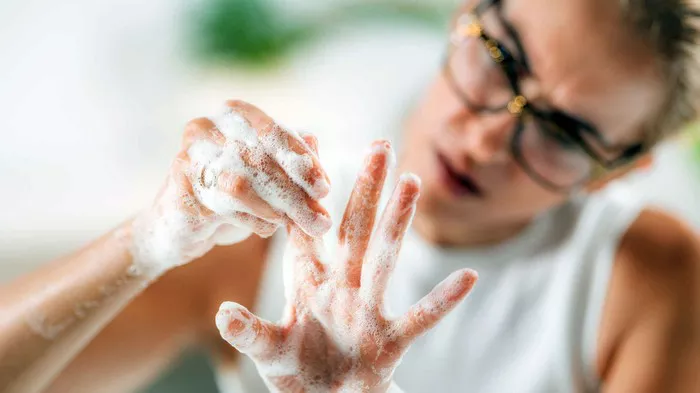Germaphobia, also known as mysophobia, is an extreme fear of germs, bacteria, or contamination. While it is natural to be concerned about hygiene and cleanliness, germaphobia can interfere with daily life and lead to distressing compulsive behaviors. This article explores the symptoms of germaphobia, when to be concerned, available treatment options, and strategies for managing the condition effectively.
Symptoms of Germaphobia
The symptoms of germaphobia can be physical, emotional, or behavioral. Individuals with this condition often engage in excessive cleanliness practices and experience heightened anxiety about contamination.
Emotional and Psychological Symptoms
- Intense fear of germs, bacteria, viruses, or contamination
- Persistent thoughts about getting sick
- Anxiety in situations involving dirt, unclean surfaces, or crowds
- Fear of physical contact with others, especially shaking hands or touching shared objects
- Obsessive thoughts about hygiene and sanitation
Behavioral Symptoms
- Excessive handwashing, often with harsh soaps or disinfectants
- Avoidance of certain places, such as public restrooms, hospitals, or restaurants
- Refusal to touch surfaces like doorknobs, elevator buttons, or shopping carts
- Using gloves, tissues, or other barriers to avoid direct contact with objects
- Cleaning and disinfecting personal spaces excessively
- Avoiding social interactions due to fear of contamination
Physical Symptoms
- Skin irritation or dryness due to frequent handwashing
- Increased heart rate or palpitations when exposed to perceived contaminants
- Shortness of breath or dizziness in stressful situations
- Nausea or digestive issues triggered by anxiety
When to Be Concerned
While general hygiene awareness is beneficial, germaphobia becomes problematic when it significantly disrupts daily life. Here are some signs that indicate a need for professional evaluation:
- Inability to function normally at work, school, or social settings due to hygiene concerns
- Spending excessive time on cleaning rituals, interfering with daily responsibilities
- Avoidance behaviors leading to isolation or distress
- Symptoms overlapping with obsessive-compulsive disorder (OCD)
- Persistent anxiety and fear that cannot be managed through rational thinking
- Skin damage or medical issues from excessive handwashing or cleaning
If germaphobia is causing significant impairment or distress, seeking professional help is recommended.
Causes and Risk Factors
Germaphobia can develop due to a variety of factors, including genetic predisposition, environmental influences, and psychological triggers.
Genetic and Biological Factors
- Family history of anxiety disorders or OCD
- Overactivity in brain regions responsible for fear and anxiety
- Chemical imbalances in neurotransmitters such as serotonin
Environmental and Psychological Triggers
- Exposure to traumatic events, such as severe illness or medical conditions
- Overprotective upbringing with excessive emphasis on cleanliness
- Influence of media and public health concerns, especially during pandemics
- Personal experiences with infections or contamination-related trauma
Treatment Options
Several treatment methods can help individuals manage germaphobia effectively. Treatment typically involves therapy, medication, and self-care strategies.
Cognitive-Behavioral Therapy (CBT)
CBT is one of the most effective treatments for germaphobia. It helps individuals reframe negative thought patterns and gradually reduce their fear of germs.
Exposure Therapy: Gradual exposure to feared situations, such as touching a doorknob without immediately washing hands, can desensitize the person to anxiety triggers.
Cognitive Restructuring: Identifying and challenging irrational fears related to germs and contamination.
Behavioral Modification: Encouraging healthier hygiene habits without compulsive actions.
Medication
In severe cases, medication may be prescribed to help manage anxiety and compulsions.
Selective Serotonin Reuptake Inhibitors (SSRIs): Medications like fluoxetine or sertraline can reduce obsessive-compulsive behaviors.
Anti-Anxiety Medications: Used for short-term relief but not recommended for long-term use due to dependency risks.
Mindfulness and Relaxation Techniques
Practicing relaxation techniques can help individuals manage anxiety symptoms.
- Deep Breathing Exercises
- Progressive Muscle Relaxation
- Mindfulness Meditation
- Yoga or Physical Exercise
Support Groups and Therapy
Joining a support group can provide reassurance and shared experiences with others facing similar struggles.
Talking to a therapist can help address underlying fears and provide coping strategies.
Coping Strategies for Everyday Life
Managing germaphobia involves finding a balance between cleanliness and excessive fear. Here are some practical coping strategies:
Establish Healthy Hygiene Habits
Follow recommended handwashing guidelines without excessive scrubbing.
Use hand sanitizers only when necessary.
Keep personal and home hygiene at a reasonable level without overdoing it.
Challenge Negative Thoughts
Remind yourself that complete avoidance of germs is impossible and unnecessary.
Recognize that exposure to some bacteria can actually strengthen the immune system.
Educate yourself on realistic risks of germs versus exaggerated fears.
Gradual Exposure
Slowly reduce compulsive behaviors by challenging yourself to touch surfaces and wait before washing hands.
Set small goals, such as delaying handwashing by a few minutes after touching an object.
Increase exposure over time to build tolerance and reduce fear.
Seek Professional Help
If symptoms persist, worsen, or significantly interfere with daily life, professional treatment is recommended. Therapy and counseling can provide essential support and guidance.
Conclusion
Germaphobia is a real and often debilitating condition that can interfere with daily activities and mental well-being. While concern about cleanliness is natural, excessive fear and avoidance behaviors may require intervention. Recognizing symptoms, understanding when to seek help, and using effective treatment methods can help individuals manage their condition. With proper therapy, support, and self-care, people with germaphobia can lead balanced and fulfilling lives.
You Might Be Interested In:

